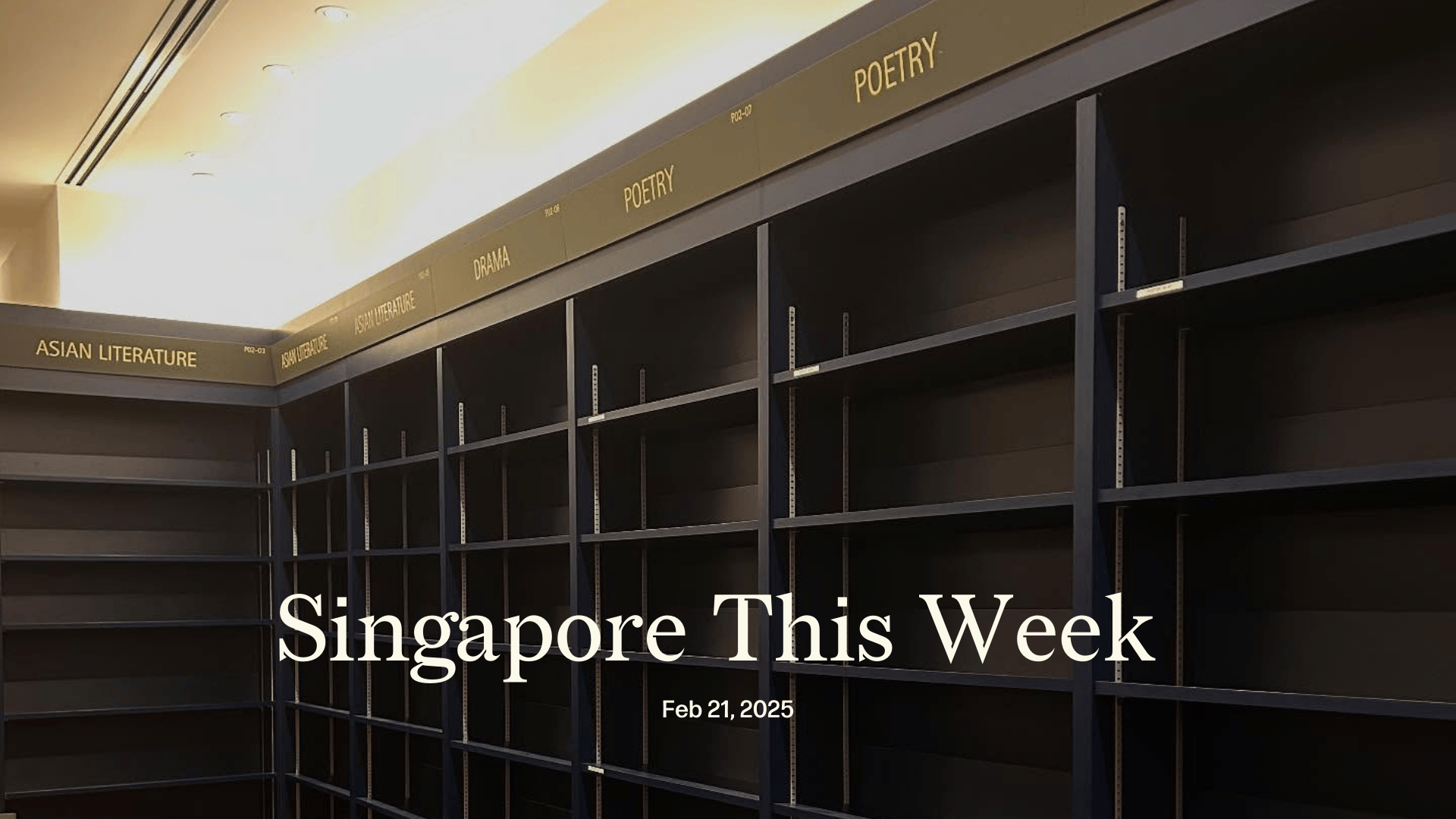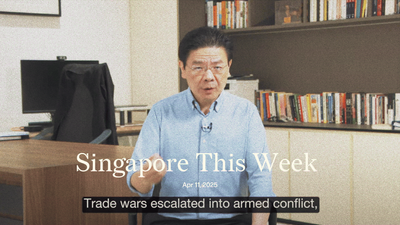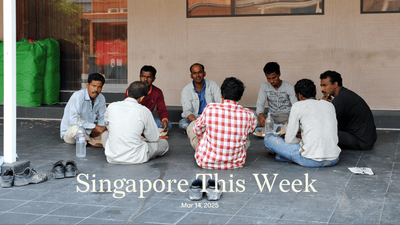Politics: God our maker doth provide
“First, I will provide eight hundred dollars in CDC vouchers to every Singaporean household,” said Lawrence Wong, prime minister and finance minister, as he announced this year’s budget. I will provide, I will provide, I will provide. Those in smaller homes get more. Families get more. And to mark Singapore’s 60th birthday—why not?—every adult citizen gets more. Hallelujah, manna from heaven. Wong, Singapore’s second most popular politician according to Jom’s voter sentiment survey, may soon pip his predecessor to first.
Not so fast. The electorate today is a little more skeptical than before of such goodie grandstanding before a general election (GE). His use of “I” instead of “we” attracted scorn, with one Redditor citing “If You Want to Be the Boss, Say ‘We’ Not ‘I’”, an article in the Harvard Business Review. “Individuals with lower status overwhelmingly tended to use first-person singular pronouns (‘I’) compared to individuals with higher status.” Is Wong’s use of “I” a sign of insecurity? He was not the unanimous choice of the ruling People’s Action Party (PAP) for the top job, unprecedented in Singapore’s history. Perhaps we shouldn’t read too much into all this. Wong might be more concerned that Singaporeans are increasingly wisening up to the PAP’s narrative of the benevolent provider. In reality, it’s simply giving Singaporeans back our own money.
Sure, an election budget is a feature of many democracies, and there’s no reason to assume the opposition would act differently if in power. Yet the related narrative being picked apart is that high domestic inflation is not the fault of the PAP, but mostly due to external factors, as Wong has long suggested. Economists Linda Lim and Nigel Chiang have argued that this ignores domestic sources, such as high rents and wages, which are rooted in our overall developmental strategy. And this past week, Han Fook Kwang, a former editor of The Straits Times (ST), said the PAP can do more to rein in living costs, which as Jom’s survey and every other has shown, is the most important election issue.
Finally, a viral video this week showed how the PAP’s messaging has flip-flopped in a decade. In 2015, Chan Chun Sing, then a minister without portfolio, berated parties who offered monthly handouts of S$300. The video contrasts Chan’s hectoring with Wong’s divine proclamations, and is worth watching just for that. But also for the apparent double-standards. When others dole out cash, it’s bribery and welfare that will empty the coffers; when we do it, it’s rational, pragmatic, justified and caring. My God will supply every need of yours.
Politics: Step Up
A district court found Pritam Singh, Workers’ Party (WP) chief, guilty on two charges of lying to Parliament, and fined him S$7,000 for each. The verdict, which he said he’ll appeal, doesn’t disqualify him from politics. Asked if he might nevertheless be forced to step down, Singh said: “I think the need of the hour is for me to step up…”, the last two words delivered with a defiant jab of the chin. Choreographed or not, “Step Up” has quickly become a battle cry for supporters, and perhaps some fence-sitters, who feel that the intense political scrutiny of a crime with no “appreciable harm”, and the timing of a champagne budget, delivered one day after the verdict, has been unfair on the WP.
Linguistic anthropologists have long tried to understand the hold slogans have on people. Barack Obama’s “Yes, we can” used rhetorical devices powerful enough to turn it into a spiritual, almost religious incantation that raised him to the US presidency. In a different time and place, Lal Bahadur Shastri, Indian prime minister (1964-1966), electrified an entire nation with the hypnotic “Jai Jawan, Jai Kisan” (Victory to the soldier, Victory to the farmer). “Amandla!” (Power!) shouted Nelson Mandela on emerging from prison; “Ngawehtu!” (to the people!) responded his followers, bringing the apartheid regime in South Africa to its knees. The ugly power of “Make America Great Again” has upended a democracy and poses a serious threat to the global order too.
Abstractions, musicality and mysticism are not necessary for slogans to become earworms though. Bill Clinton, US president (1993-2001), won with the blunt “It’s the economy, stupid”. Republicans turned out in their millions to vote for Dwight Eisenhower (Ike), also US president (1953-61), on “I like Ike!”, more advertising jingle, less political mantra. Public relations geniuses in the UK turned Gordon Brown’s dourness into a memorable Marvel reference. “Not flash, just Gordon” still delights. “Step Up” lacks wordplay or much specificity. It may fizzle out or drown in all the other social media dross. But it has a kinetic energy to it—a Bob Marley-esque call to action at a time when people increasingly feel devoid of agency. If the WP manages to keep up the momentum their new slogan has generated, it may one day end up trapping lightning in a bottle.
Society: Malayans unite
Wednesday evening saw an incredible cross-Malayan show of solidarity for Pannir Selvam, a Malaysian who was due to be executed here yesterday. Abolitionists gathered for candlelight vigils in Ipoh, outside the Singapore High Commission in KL, and at Hong Lim Park here. Late in the evening came the remarkable news—Woo Bih Li, high court judge, ordered a stay of execution, pending Pannir’s complaint to the Law Society about Ong Ying Ping, his former counsel, and the outcome of an ongoing challenge to the Misuse of Drugs Act.
Pannir, arrested in 2017 for trafficking heroin, has long insisted that he was duped into carrying a package across the border. The dangers of drugs notwithstanding, there is no conclusive evidence that the death penalty serves as an effective deterrent to crime. There is blood on all our hands when the state kills people like Pannir. It’s high time we ended the barbaric practice, and embraced more humane, restorative forms of justice.
Society: Of misogynists and men
A feature by ST examining incels online has ignited a firestorm of vitriol for writer Teo Kai Xiang. Teo noted that his article had “triggered the most online harassment and hate mail” he’s received as a journalist. Incel, a portmanteau of “involuntarily celibate”, is a term that refers to an online subculture of people (primarily hetrosexual males), who, frustrated by their inability to find a romantic or sexual partner, develop often hostile and violent attitudes towards women. In the feature, Eviane Leidig, an associate fellow at the Netherlands-based International Centre for Counter-Terrorism described incels as believing that they are entitled to sexual and romantic relations with women, who are “valued only for serving these needs”. But due to their “physical appearance and low social status” incels think that they’ll never be successful with women. “Unfortunately, this crisis of masculinity has become a crisis of misogyny,” Leidig said.
One major sticking point for critics of Teo’s article is a reference to the sub-Reddit group r/SingaporeRaw, which he claims propagates incel views. Academic Yasmine Wong, who last year argued that misogyny should be treated as a national security issue, noted that online Singapore-based communities like this and HardwareZone host misogynistic narratives which possibly mirror those in the wider manosphere. In “Was the Straits Times Incel Article A Deliberate Attack Against This Subreddit?” (which sounds a little conspiratorial), Redditor Founders_Mem_90210 posited that there was a “deliberate and possibly malicious attempt at character assassinating not just Singaporean males online…with the insulting slur of ‘incel’, but also THIS ENTIRE SUBREDDIT AS A WHOLE.” Responding to the post, morning_flower_68 warned that the effect of ST’s article was to “paint every complaining male an INCEL.” User OttoScoffmanz found the article interesting, though felt it was incomprehensive, biased and labelled anybody who believed in men’s rights as misogynists. “Discussion does not equate to hate,” they said. The sentiments were shared by user DoubleStandardsLlama in “Complain about NS = incel”, who surmised: “It’s always men’s fault even when men are increasingly facing mental health issues, suicide and so on.”
It’s a shame that so many readers chose to take the article as a personal attack: to fixate on one aspect of it is to miss the forest for the trees. The “modern male is struggling”, as author Richard Reeves put it, and this crisis must be addressed along with all related ones: the narratives that reinforce gender stereotypes and perpetuate the patriarchy; the rise of manosphere ideologies and the promulgation of misogyny and gender-based violence; as well as the loneliness epidemic that surely afflicts incels. These issues don’t just affect one gender or the other. They impact us all.
Some further reading: In “Forever alone: HardwareZone’s BBFAs”, writer Thiyaghessan Poongundranar looks at how similar self-described BBFAs (Bui Bui Forever Alone)—an online community of overweight, single men dealing with sexual frustration—are to their Western counterparts, the incels.
History weekly by Faris Joraimi
Over the course of the 19th century, camphor trees and elephants, once important to Bataks and Malays respectively, lost their economic and social importance as both groups embraced religions upholding Man’s superiority over the wilderness. This is the story told by National University of Singapore historian Faizah Zakaria in The Camphor Tree and the Elephant: Religion and Ecological Change in Maritime Southeast Asia, which recently won the Harry J. Benda Prize. The prestigious prize is awarded to outstanding first books by scholars of Southeast Asian studies, and is presented by the Association of Asian Studies (AAS), a learned society based in the US. In the book, Faizah narrates religious conversion in the uplands of North Sumatra and the Malay Peninsula, arguing that transition from animism to monotheistic traditions like Islam and Christianity changed people’s relationship to landscapes. Animism and monotheism were not always mutually exclusive, but their distinctions grew sharper with the rise of capitalism, colonialism and modern technology. Conversion can be understood less as a personal decision, and instead as a collective transformation of how groups perceive their relationship to the physical environment. I’m oversimplifying, of course. Like other academic books, Faizah’s work is in conversation with research ranging from debates about the Anthropocene (our current geological age in which humans are the most dominant influence on climate and ecology) to religion and the everyday.
The introduction may be daunting, since it’s written for other specialists, but the chapters contain fascinating stories. (There’s stuff on Malay elephant lore.) This year’s Benda Prize had two recipients, the other being Adam Bobbette’s The Pulse of the Earth: Political Geology in Java, which is about how different kinds of knowledge about Indonesian volcanoes shaped modern earth sciences. More historians are paying attention to the environment now, in large part a response to our climate emergency. If you needed proof that environmental history matters to people, there was some uproar last week about the Malay name of the Botanic Gardens MRT station (Kebun Bunga) being removed with new platform signage. This gets to how our supposed multiracialism is visibly performed in public texts. Botanic Gardens is one of the few MRT stations—which don’t already have Malay names—that displays the name’s translation in our National Language. But the Gardens’ historical significance to Singapore’s “Malay” community is due to a bygone Javanese kampung (called Kampung Kebun Bunga) that housed the horticulturalists and research assistants who supported its scientific work. After a transit enthusiast wrote to the Land Transport Authority, the name was reinstated.
Arts: ‘Right-sizing’, not down-sizing
That’s the assurance given by real estate developer Toshin Development over size fluctuations to one of the barometers of our literary microclimate: Books Kinokuniya. According to the landlord’s statement, the beloved bookstore in Takashimaya Shopping Centre is undergoing a “space reconfiguration to refine its book collection while incorporating a lifestyle element”. That element includes a new cafe, but currently looks like hollowed out shelves and harried staff in the throes of reshuffling. Phrases like “key anchor tenant” and “quality titles housed in a pleasant ambience” may not entirely comfort fans and customers, nor dispel the dark clouds that have been hanging around brick-and-mortar bookstores here. Books Kinokuniya has so far weathered a tsunami of rising rental costs and low footfall that has swept away other chains and outlets. This includes the drawn-out death of Times Bookstores last year, and the shuttering of local publisher Epigram’s coffee bookshop at the Tanjong Pagar Distripark last month. And this isn’t the first dent to Books Kinokuniya’s flagship outlet, either. From 1999 to 2013, it occupied 42,000 sq ft (about three Olympic-sized swimming pools) on the mall’s third floor. Then it retreated to the fourth floor to make way for other retail offerings, taking a 25 percent space cut. But it would later reclaim about 5,000 sq ft of space when Imperial Treasure Teochew Cuisine bowed out in 2016.
Whether this latest erosion of space marks a passing monsoon surge—or something more permanent—remains to be seen. Where homogeneous chains have come and gone, specialty bookstores here are still clinging on, bolstered by loyal communities of readers, including a burgeoning book club scene. It’s fair to say Books Kinokuniya occupies its own category: the grande dame of bookstores here, while sprawling in its range, has always felt intimate and specific in its reach. You can get lost in its mazy layout, find yourself a quiet nook for an undisturbed browse, or manifest a literary meet-cute with a random book launch around a corner. And its industrious, blue-apronned staff, both textual and navigational compasses, might well have stepped straight out of Nora Ephron’s “You’ve Got Mail”—more reminiscent of the dreamy book lovers in Meg Ryan’s fairy-lit indie bookstore than the anonymous temps in Tom Hanks’s Amazonian hypermarket. “Books will always be around,” novelist Daryl Qilin Yam told ST, “but something ineffable shrinks and shutters whenever the same happens to bookstores.” Books Kinokuniya, we’re all hoping, will stem the tide for now.
Tech: Big budget for small start-ups
Even as vouchers flutter down confetti-like on Singaporeans, this year’s budget also includes a deliberate push to fortify the country’s position as a global innovation hub. One of the budget’s cornerstones is the S$3bn top-up to the National Productivity Fund (NPF), aimed at attracting high-value investments in frontier technologies like Artificial Intelligence (AI) and quantum computing. Lawrence Wong, finance and prime minister, emphasised Singapore’s ambition to pivot from cost-based competition to value creation, leveraging strengths in semiconductors and biotech. The country supplies 10 percent of the world’s semiconductor output and 80 percent of the world’s DNA chips, which are used to identify diseases and mutations. The NPF will also fund a national semiconductor R&D facility and upgraded biotech infrastructure in one-north.
Meanwhile, the new Enterprise Compute Initiative allocates $150m to help SMEs access AI tools via partnerships with major cloud providers. This complements existing schemes such as the Productivity Solutions Grant, ensuring businesses can integrate AI-driven analytics and digital solutions into their operations.
To bridge financing gaps for high-growth firms, Singapore is launching a US$745m (S$1bn) private credit fund targeting Asia’s underserved market. Industry experts like Innoven Capital’s Paul Ong said that the fund could help local enterprises scale up and innovate by helping them move beyond funding sources that only take equity. At the same time, the Economic Development Board’s new Global Founder Programme seeks to attract experienced entrepreneurs to start and grow ventures in Singapore.
These measures reflect Singapore’s multi-pronged strategy: nurturing cutting-edge R&D, democratising access to AI, and expanding financing avenues. By aligning public investment with private sector dynamism, the budget aims to sustain Singapore’s relevance in the reshaped global tech landscape, helping SMEs and startups thrive amid intensifying competition.
Tech: Crinkles in the chip industry
Geopolitical battles over semiconductor chips are intensifying, with Singapore caught in the crossfire. US officials previously announced they would investigate Singapore’s role in helping Chinese AI startup DeepSeek sidestep export controls aimed at restricting China’s access to Nvidia chips. The suspicion arose after it was reported that Singapore drove over 18 percent of Nvidia’s global revenue in 2024, trailing just behind the US.
In reply to a parliamentary question, Tan See Leng, second minister for trade & industry, clarified that Singapore contributes less than 1 percent of Nvidia’s physical deliveries, despite 22 percent of business being invoiced through the country. This discrepancy shows Singapore is a financial rather than a logistical hub for tech transactions. Singapore’s pivotal role in global trade—facilitated by its strategic location, robust legal system, and advanced infrastructure—also brings challenges. It must retain trade neutrality while complying with international export laws.
Singapore’s customs authorities are actively cooperating with US officials, and the outcome of this investigation may influence future policies and practices concerning tech transactions in the region. Given the Trump administration’s readiness to slap tariffs on trade arrangements it deems unfavorable, Singapore would do well not to draw too much attention to itself.
If you enjoy Jom’s work, do get a paid subscription today to support independent journalism in Singapore.







